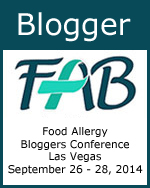Basically, she knows her stuff about 504 plans.
Since this is the time for school registration and meetings for the upcoming school year, I thought it would be a good time to cover the basics about 504 plans.
If your child is starting kindergarten in September and has food allergies, think about creating a 504 plan. I plan to next year when Little Guy goes to kindergarten.
What is a 504 plan?
According to Laurel, "504 is a federal law that requires schools to make accommodations or changes in the way they do things for children with disabilities. Food allergies are usually considered a disability."
Does my child really need it?
I've heard parents question whether their child needs a 504 plan. They don't want their child to be "labeled" as having a disability, or they don't want to go through all the fuss. Every parent knows what's best for their child of course, but I have to say, I'm pro-504 plan. I'm definitely asking for one due to Little Guy's food allergies to dairy, eggs, nuts and sesame. I want everyone around him at school to know how to keep him safe. It's just another way I hope to ensure food allergy safety when he's at school.
How should I start the 504 process?
You've come to the right place. Laurel graciously shared her advice to start the 504 process. So, I give you...
6 Steps to Creating a 504 Plan: Food Allergies
1. Get a written diagnosis of your child's allergy from your pediatrician or allergist. It should explain the severity of the allergy (i.e. is it life-threatening) and why your child will need accommodations.
2. Write a letter to your school's 504 coordinator requesting an evaluation meeting. The letter should say that your child has a disability which requires special needs.
3. Put together any documents that explain your child's allergy - what symptoms he/she has, past reactions, health records, etc.
4. Make a list of the accommodations you want to propose before the meeting. Common items include restricting allergens in the classroom, an allergen-safe table in the cafeteria, walkie talkies for recess, where the epinephrine will be kept. Think about all the places and things your child will encounter during the school day and decide what he/she needs to be safe and included. For example, consider the classroom, the cafeteria, the bus, recess and gym, after school activities, arts and crafts. How will snacks, lunch, birthday parties be handled? Will surfaces be washed?
5. Attend the evaluation meeting with your list of accommodations and other documents. Be prepared to negotiate with the school and to explain why your child needs the things you are asking for.
6. If you cannot come to an agreement, consider your enforcement options. The Department of Education Office for Civil Rights hears 504 cases, as well as your state department of education.
Here are a few great links about 504's and food allergies that I'm going to reference for Little Guy. Hoping they might help you too!
Sample 504 Plan from KFA (Kids with Food Allergies)
An amazing and comprehensive list of 504 related links from Nut Free Wok
Guidelines for managing food allergies in schools from the CDC
Greenlaurel Documents Food Allergy Advocacy Tools












0 comments:
Post a Comment